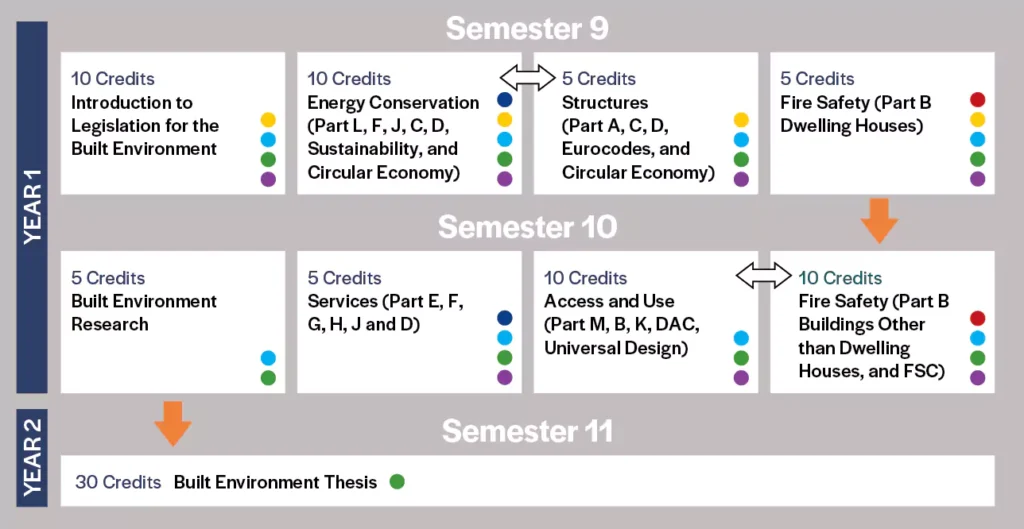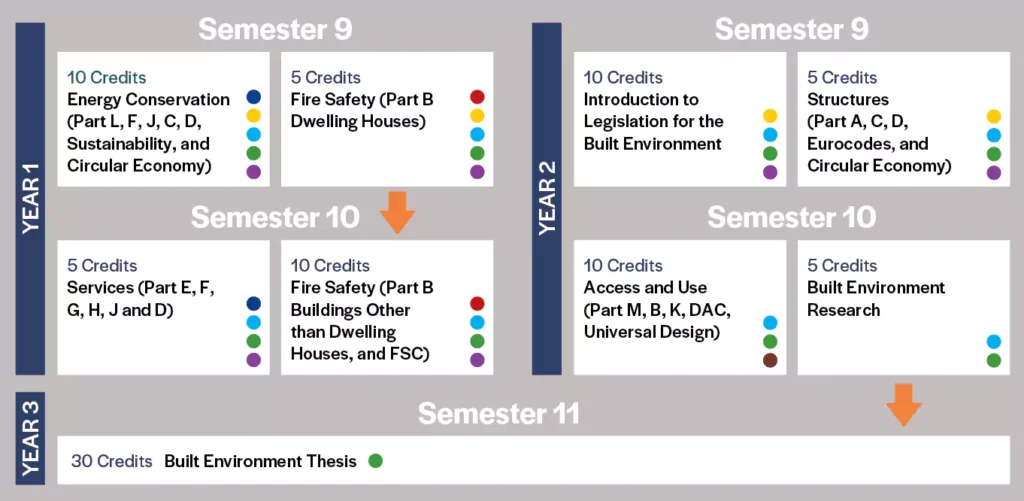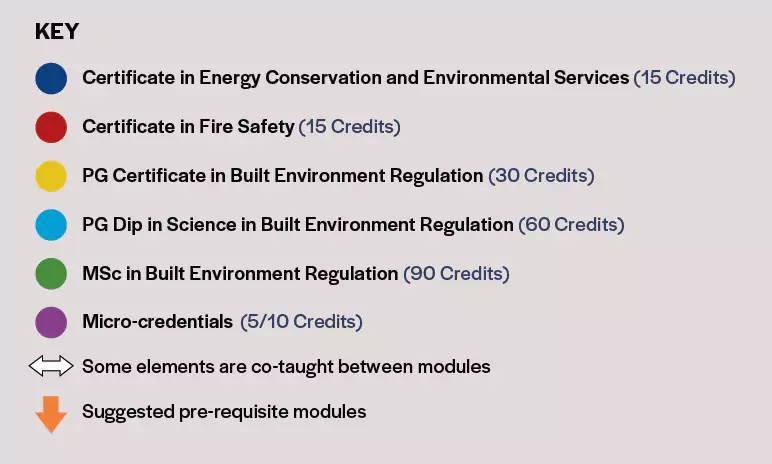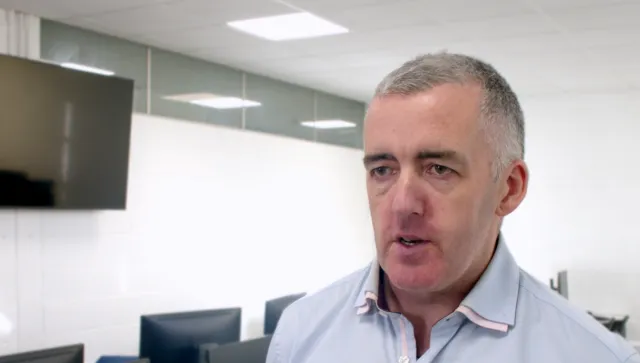View all Courses
Built Environment Regulation
Postgraduate Diploma in Science
Course Details
| Course Code | GA_EBEPG_O09 |
|---|---|
| Level | 9 |
| Duration | 2 years |
| Credits | 60 |
| Method of Delivery | Blended |
| Campus Locations | Galway City – Dublin Road |
| Mode of Delivery | Part Time |
Course Overview
The programme aims to afford advanced experience, knowledge, and training to fulfil, in part, the onerous and challenging roles, duties and responsibilities associated with a range of Built Environment Regulations in the Irish Construction Industry.
This Postgraduate Diploma is designed for a multidisciplinary cohort across the built environment disciplines e.g. Architecture, Engineering, Building Surveying, Architectural Technology, and Construction Management, among others. A multi-disciplinary cohort will be beneficial to the programme as it will provide a cross-pollination of ideas, shared experiences and appreciation for each others roles and responsibilities in the Built Environment.
It is designed to meet the postgraduate and continuing professional development needs of these disciplines, to develop their competence in these areas by facilitating knowledge gained through training and applied experience. It will be particularly beneficial to new entrant graduates who have recently entered the work force in the last one to three years. It will also be beneficial to lifelong learners and more experienced professionals as Continuing Professional Development, up-skilling, retraining, and as a refresher course.
Furthermore, the programme can be undertaken on a module-by-module basis, if so desired, by accumulating credits. Alternatively, a programme of shorter duration can be commenced, with the view to continuing to complete the Postgraduate Diploma and / or MSc in Built Environment Regulation at some point in the future. This flexibility is designed to accommodate an adult working population. The difference between this qualification and the MSc in Built Environment Regulation is that there is no research capstone module requirement.
Students can choose to take the course as full-time (1 year) or part-time (2 years).
Funding Opportunity
These programmes have been developed with support from the HCI 3 funded DASBE project (see dasbe.ie).
The DASBE funding support will be reviewed annually and will run until 2024.
The programme is CABE accredited.
For more information see the programme brochure.
CPD Approved
Course Details
Year 1
| Semester | Module Details | Credits | Mandatory / Elective |
|---|---|---|---|
| 1 |
Energy Conservation (Part L, F, J, C, D, Sustainability, and Circular Economy)This module aims to develop an in-depth knowledge, understanding and experience in Part L(Conservation of Fuel and Energy in Dwellings; Conservation of Fuel and Energy in Buildings Other than Dwellings), while incorporating aspects of Part C, Part, Part F and Part J, health and safety and circular economy. On completion of this module, learners should be able to demonstrate their understanding and application of Part L and demonstrate compliance in the building regulations. Learning Outcomes 1. Investigate, determine and inform their knowledge, skills and experience relating to Part L Conservation of Fuel and Energy for Dwellings (L1, L2 and L6),The European Union (Energy Performance of Buildings) Regulations 2019, Regulation 7 and 8, Supplementary Documents, Acceptable Construction Details, Dwelling Energy Assessment Procedure,Health and Safety and best practice requirementsin the Irish built environment, in areasonably practicable way. 2. Investigate, determine and inform their knowledge, skills and experience relating to Part L Conservation of Fuel and Energy for Buildings other than Dwellings (L1, L4and L5),Health and Safety and best practice requirementsin the Irish built environment, in areasonably practicable way. 3. Investigate, determine and inform their knowledge, skills and experience relating toPart CSite Preparation and Resistance to Moisture, including C3 Dangerous Substances, C4 Resistance to Weather and Ground Moisture andC5 Definitions, Health and Safety and best practice requirements in the Irish built environment, in a reasonably practicable way. 4. Investigate, determine and inform their knowledge, skills and experience relating toPart DMaterials and Workmanship, including D1 Materials and Workmanship, D3Definitions and Supplementary Documents, Health and Safety and best practice requirements in the Irish built environment, in a reasonably practicable way. 5. Investigate, determine and inform their knowledge, skills and experience relating toPart F Ventilation,F2 Condensation in Roofs, Health and Safety and best practice requirements in the Irish built environment, in a reasonably practicable way. 6. Exercise professional judgement in the implementation ofinquiry into sustainable material choices forthe circular economyindwellings and buildings other than dwellings inthe Built Environment. |
10 | Mandatory |
| 1 |
Fire Safety (Part B Dwelling Houses)This module aims to develop an in-depth knowledge, understanding and experience of the design, site and compliance requirements for Part B Dwelling Houses(including an overview of stairs TGD K, B and M). On completion of this module, learners should be able to demonstrate their understanding and application of Part B Volume 2 and demonstrate compliance in the building regulations, and to model some legislative roles and responsibilities required in the Irish built environment regulations. Learning Outcomes 1. Investigate, determine and inform their knowledge, skills and experience relating toPart B Dwelling Houses B6: Means of warning and escape, and B11: Definitions,Health and Safety and best practice requirementsin the Irish built environment, in areasonably practicable way. 2. Investigate, determine and inform their knowledge, skills and experience relating toPart B Dwelling Houses B7: Internal Fire Spread (Linings),Health and Safety and best practice requirementsin the Irish built environment, in areasonably practicable way. 3. Investigate, determine and inform their knowledge, skills and experience relating toPart B Dwelling Houses B8: Internal Fire Spread (Structure), and SupplementaryGuidance to Technical Guidance Document B (Fire Safety),Health and Safety and best practice requirementsin the Irish built environment, in areasonably practicable way. 4. Investigate, determine and inform their knowledge, skills and experience relating toPart B Dwelling Houses B9: External Fire Spread,Health and Safety and best practice requirementsin the Irish built environment, in areasonably practicable way. 5. Investigate, determine and inform their knowledge, skills and experience relating toPart B Dwelling Houses B10: Access and Facilities for the Fire Service,Health and Safety and best practice requirementsin the Irishbuilt environment, in areasonably practicable way. |
05 | Mandatory |
| 2 |
Services (Part E, F, G, H, J and D)This module aims, in as reasonably practicable way as possible, to develop an in-depth knowledge, understanding and experience of the design, site and compliance requirements for Part E (Sound), Part F (Ventilation), Part G (Hygiene), Part H (Drainage and Wastewater Disposal), and Part J (Heat Producing Appliances). On completion of this module, learners should be able to demonstrate, to a high standard of completion, their understanding and application of Part E, F, G, H, and J through individual assessment and project work, to demonstrate compliance in the building regulations, and to model some legislative roles and responsibilities required in the Irish built environment regulations. Learning Outcomes 1. Investigate, determine and inform their knowledge, skills and experience relating to Part E Sound, E1 Sound, E2 Reverberation, E3 Definitions,Health and Safety and best practice requirementsin the Irish built environment, in areasonably practicable way. 2. Investigate, determine and inform their knowledge, skills and experience relating to Part F Ventilation, F1 Means of Ventilation, Supplementary Documents,Health and Safety and best practice requirementsin the Irish built environment, in areasonably practicable way. 3. Investigate, determine and inform their knowledge, skills and experience relating to Part G Hygiene, G1 Bathrooms and Kitchens, G2 Sanitary Conveniences and Washing Facilities, G3 Definitions,Health and Safety and best practice requirementsin the Irish built environment, in areasonably practicable way. 4. Investigate, determine and inform their knowledge, skills and experience relating to Part H Drainage and Wastewater Disposal, H1 Drainage Systems, H2 Wastewater Treatment Systems, H3 Definitions, Health and Safety and best practice requirementsin the Irish built environment, in areasonably practicable way. 5. Investigate, determine and inform their knowledge, skills and experience relating to Part J (J1 to J7 inclusive),Health and Safety and best practice requirementsin the Irish built environment, in areasonably practicable way. |
05 | Mandatory |
| 2 |
Fire Safety (Part B Buildings Other than Dwelling Houses, and FSC)This module aims to develop an in-depth knowledge, understanding and experience of the design and compliance requirements for Part B Buildings other than Dwelling Houses. On completion of this module, learners should be able to demonstrate their understanding and application of Part B and should also be able to demonstrate compliance with the fire sections of the building regulations, including the preparation of a Fire Safety Certificate Application. Learning Outcomes 1. Investigate, determine and inform their knowledge, skills and experience relating toPart B, B1 Means of escape in case of fire (including an overview of commercial stairs TGD K, B, M), Health and Safety and best practice requirements in the Irish built environment, in a reasonably practicable way. 2. Investigate, determine and inform their knowledge, skills and experience relating toPart B, B2Internal fire spread (Linings), Health and Safety and best practice requirements in the Irish built environment, in a reasonably practicable way. 3. Investigate, determine and inform their knowledge, skills and experience relating toPart B,B3 Internal fire spread (Structure),Health and Safety and best practice requirements in the Irish built environment, in a reasonably practicable way. 4. Investigate, determine and inform their knowledge, skills and experience relating toPart B,B4External fire spread,Health and Safety and best practice requirements in the Irish built environment, in a reasonably practicable way. 5. Investigate, determine and inform their knowledge, skills and experience relating toPart B,B5 Access and facilities for the fire service,Health and Safety and best practice requirements in the Irish built environment, in a reasonably practicable way. 6. Investigate, determine and inform their knowledge, skills and experience relating to the application ofand submission thereafter ofaFire Safety Certificate for a building other than a dwelling. |
10 | Mandatory |
Year 2
| Semester | Module Details | Credits | Mandatory / Elective |
|---|---|---|---|
| 1 |
Introduction to Legislation for the Built EnvironmentThis module introduces, explains and evaluates the legal foundations of the Built Environment Legislation in Ireland.On completion of the module, learners should be able to demonstrate as far as reasonably practicable their understanding and competence in relation to distinguishing and understanding in general the foundations of thelegal obligations involved in the Built Environment Framework. Learning Outcomes 1. Evaluate as far as reasonably practicable theLegal system in Ireland,Built Environment Statutory Instruments, Enforcement Authorities and Stakeholders in relation to Built Environment. 2. Analyse and evaluate as far as reasonably practicable, the legal obligations in relation to the law of contract and Construction Contracts. 3. Demonstrate a knowledge and competence as far as reasonably practicable the Health and Safety requirements, the legal understanding of a Competent person in relation to Health & Safety Legislation -with emphasis on applying to Construction Duty holders underSafety, Health and Welfare at Work (Construction) Regulations (2013). 4. Evaluate and demonstrate as far as reasonably practicable an understanding of the key foundations and principles of the Building Control Act Regulations 1997-2020. 5. Evaluate and demonstrate as far as reasonably practicable an understanding of the key foundations and principles of the Building Control Regulations with emphasis on Certificates of Compliance with practical BCMS commencement notice assessment. 6. Evaluate and demonstrate as far as reasonably practicable an understanding of Building Control Legal Interpretations and Definitions. |
10 | Mandatory |
| 1 |
Structures (Part A, C, D, Eurocodes, and Circular Economy)This module outlines the requirements of Part A Structures and the Eurocodes with a specific focus on dwellings and small buildings, and sustainable structural choices for the circular economy. On completion of the module, learners should be able to demonstrate their knowledge, skill and competence as far as is reasonably practicable in this area of study through assessment and project work relevant to the Built Environment in the Republic of Ireland. Learning Outcomes 1. Demonstrate their knowledge, skill and competence asfar as is reasonably practicable in Part A Structures, A1 Loading and A4Definitions, Health and Safety and best practice requirementsin the Built Environment in the Republic of Ireland. 2. Demonstrate their knowledge, skill and competence asfar as is reasonably practicable in Part A Structures, A2 Ground Movement, Health and Safety and best practice requirements in the Built Environment in the Republic of Ireland. 3. Demonstrate their knowledge, skill and competenceasfar as is reasonably practicable inPart A Structures, A3 Disproportionate Collapse, Health and Safety and best practice requirementsin the Built Environment in the Republic of Ireland. 4. Demonstrate their knowledge, skill and competenceasfar as is reasonably practicable inPart CSite Preparation and Resistance to Moisture, including C1 Preparation of Site, C2 Subsoil Drainage, C3 Dangerous Substances, C5 Definitions, Health and Safety and best practice requirementsin the Built Environment in the Republic of Ireland. 5. Demonstrate abroad understanding of the Structural Eurocodes and best practice requirementsin the Built Environment in the Republic of Ireland to a professional level. 6. Exercise professional judgement in making sustainable structural choices forthe circular economyinthe Built Environment. |
05 | Mandatory |
| 2 |
Access and Use (Part M, B, K, DAC, Universal Design)This module aims to develop an in-depth knowledge, understanding and experience of the design, site and compliance requirements for Part M (Access and Use).The module also aims to develop an in-depth knowledge, understanding and experience of relevant health and safety and best practice requirements as well as Universal Design. On completion of this module, learners should be able to demonstrate, their understanding and application of Part M and compliance in the building regulations. Learning Outcomes 1. Demonstrate systematic and comprehensive knowledge, skill and competence of Part M, Health and Safety and best practicein the Built Environment in the Republic of Ireland to a professional level. 2. Demonstrate knowledge, skill and competence of commercial stairs(Part B, M, K), Health and Safety and best practice requirementsin the Built Environment in the Republic of Ireland to a professional levelasfar as is reasonably practicable. 3. Analyse and evaluate as far as reasonably practicable Universal Design in the Built Environment in the Republic of Ireland. 4. Demonstrate knowledge, skill and competenceof the Building Regulations, Health and Safetyand best practice requirements for external and internal windows,doors and lobbies in the Built Environment in the Republic of Ireland to a professional levelasfar as is reasonably practicable. 5. Demonstrate knowledge, skill and competence of aDisabled Access Certificate in the Built Environment in the Republic of Ireland to a professional levelasfar as is reasonably practicable. |
10 | Mandatory |
| 2 |
Built Environment ResearchThis module will provide students with the required knowledge and understanding of the theoretical foundations of research design, research methodologies and methods of data collection to develop their research skills and prepare them to undertake an appropriate research project on a building regulations related topic. Learning Outcomes 1. Demonstrate a comprehensive and systematic understanding of evolving applied work-based research paradigms, methodologies, and methods, which are applicable within a built environment setting. 2. Analyse and critically evaluate published literature on a building regulations related research topic. 3. Identify, evaluate and address ethical issues related to researchmethodologies and design in the built environment. 4. Demonstrate the principles of validity and reliability in data analysis inresearch work. 5. Develop an appropriate research design, and communicate how the research project is situated within academic and professional debates in the relevant field. 6. Critically evaluate different communicationtools to translate and present applied work-based research findings to different audiences. |
05 | Mandatory |

Image description: This is an image of the part time (30 months) MSc Built Environment Regulation learning pathway for a September cohort of students. It uses the identifying colours from the legend to outline the part-time learning pathway on this course for 12 embedded programmes including 7 micro-credentials. Year 1 Semester 9 contains two modules as follows: Energy Conservation (Part L, F, J, C, D, Sustainability, and Circular Economy) (10 credits); Fire Safety (Part B Dwelling Houses) (5 credits). Year 1 Semester 10 contains two modules as follows: Services (Part E, F, G, H, J and D) (5 credits); Fire Safety (Part B Buildings other than Dwelling Houses, and FSC) (10 credits). Year 2 Semester 9 contains two modules as follows: Introduction to Legislation for the Built Environment (10 credits); Structures (Part A, C, D, Eurocodes, and Circular Economy) (5 credits). Year 2 Semester 10 contains two modules as follows: Built Environment Research (5 credits); Access and Use (Part M, B, J, DAC, Universal Design) (10 credits). Year 3 Semester 11 contains one module as follows: Built Environment Thesis (30 credits).

Image description: This is an image of the part time (30 months) MSc Built Environment Regulation learning pathway for a September cohort of students. It uses the identifying colours from the legend to outline the part-time learning pathway on this course for 12 embedded programmes including 7 micro-credentials. Year 1 Semester 9 contains two modules as follows: Energy Conservation (Part L, F, J, C, D, Sustainability, and Circular Economy) (10 credits); Fire Safety (Part B Dwelling Houses) (5 credits). Year 1 Semester 10 contains two modules as follows: Services (Part E, F, G, H, J and D) (5 credits); Fire Safety (Part B Buildings other than Dwelling Houses, and FSC) (10 credits). Year 2 Semester 9 contains two modules as follows: Introduction to Legislation for the Built Environment (10 credits); Structures (Part A, C, D, Eurocodes, and Circular Economy) (5 credits). Year 2 Semester 10 contains two modules as follows: Built Environment Research (5 credits); Access and Use (Part M, B, J, DAC, Universal Design) (10 credits). Year 3 Semester 11 contains one module as follows: Built Environment Thesis (30 credits).

Image description: This is an image of a legend identifying in different colours the 12 programme learning pathways on the MSc Built Environment Regulation. It identifies the following courses: Certificate in Energy Conservation and Environmental Services (15 Credits); Certificate in Fire Safety (15 Credits); PG Certificate in Built Environment Regulation (30 Credits); PG Dip in Science in Built Environment Regulation (60 Credits); MSc in Built Environment Regulation (90 Credits); Micro-credentials (5/10 Credits). It also indicates where some elements are taught between modules and suggested pre-requisite modules.
Recommended Study Hours per week
Examination and Assessment
On-Campus Attendance Requirement
Note: Check programme Examination and Assessment requirements, as they may involve examinations to be taken on campus.
Progression
Download a prospectus
Entry Requirements
Candidates must hold a cognate level 8 Bachelor (Hons) degree with a minimum grade classification of H2.2 or equivalent, in an appropriate Built Environment undergraduate programme or equivalent. Candidates who do not meet the H2.2 performance standard in a Level 8 award will be required to pass a qualifying assignment at an H2.2 performance standard as established by the Programme Board for the programme in question and as approved by the Registrar.
In accordance with ATU policy recognition of prior learning can be used to gain access to or exemption from this programme. ATU is committed to the principles of transparency, equity, and fairness in recognition of prior learning (RPL) and to the principle of valuing all learning regardless of the mode or place of its acquisition. Recognition of Prior Learning may be used to:
Gain access or advanced entry to a programme at Stage 2 or higher, subject to available places. (Stage 1 entry through CAO)
Gain credits and exemptions from programme modules after admission
In award years RPL will be considered, to a 50% maximum (30 credits)
Academic Code of Practice No. 6 outlines the policies and procedures for the Recognition of Prior Learning. Guidance for applicants is provided on myexperience.ie. The programme board will be expecting mapping equivalencies to the QQI Awards standard at Level 8.
English Language Requirements will be as determined by ATU and as published in the Access, Transfer and Progression code. Further details on English language requirements are available here
Testimonial

All the modules in this course have been very beneficial in my job. I work in housing in Cork County Council and Building Regulations are a big part of my job. You come across various different houses and apartments, and the fire regulations modules have helped me a lot in my role. To anyone considering studying this course, my advice would be go for it.
David Mangan , Student of the Postgraduate Diploma in Built Environment Regulations
Fees
Total Fees EU: €4000
DASBE fee: €1500. These programmes have been developed with support from the HCI 3 funded DASBE project (see dasbe.ie). The DASBE funding support will be reviewed annually and will run until 2025.
Further information on feesProfessional Accreditation
Chartered Association of Building Engineers (CABE).
Careers
There are significant employment opportunities for building regulation practitioners as specialists within their broader discipline areas of Architecture, Architectural Technology, Building Surveying, Consultancy, Consultant Engineering, Civil Engineering, Building Engineering, Building Services Engineering, Quality Engineering, Building Control Engineering, Local Authority Engineering, and Construction Management, to name a few.
By completing this programme, further employment opportunities will present in the much sought-after areas of specialist Building Regulation Engineers, Building Control Engineers, Quality Engineers, Local Authority Engineers, Designers, Builders, Assigned Certifiers and/or Ancillary Certifiers, the roles of each being defined in the Built Environment Regulations and Legislation, and also depending on each candidates’ primary undergraduate degree qualification, their professional body membership and their practice experience in the construction industry.
This qualification and sub-sets thereof will help to meet annual Continuing Professional Development requirements, and to align with professional body requirements. This programme will facilitate employment opportunities in the broad area of Building Regulations and Building Control in the private and public sector, in local authority, and on site in the construction sector.
Further Information
Who Should Apply?
Application Closing Date
Start Date
Contact Information
Department of Building and Civil Engineering
Irene Hayden
Lecturer
E: irene.hayden@atu.ie
T: +353 91 742 109
Building & Civil Engineering


